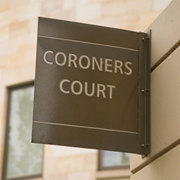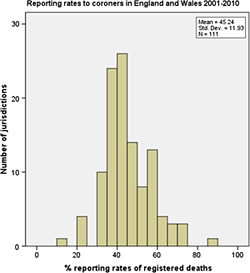Nationwide disparities of deaths reported to coroners
Thu, 31 Oct 2013 14:43:00 GMT
Research also shows gender disparity with more male deaths than female reported to the coroner
 A LEADING detective turned university researcher has discovered huge nationwide disparities in the numbers of deaths reported to coroners. It could mean that in some areas, inquests into unnatural deaths are not being conducted when they might have been deemed necessary elsewhere. Also, it has emerged that deaths of women are less likely to be reported and go to inquest. And when they do, they are less likely to result in a verdict of unnatural death.
A LEADING detective turned university researcher has discovered huge nationwide disparities in the numbers of deaths reported to coroners. It could mean that in some areas, inquests into unnatural deaths are not being conducted when they might have been deemed necessary elsewhere. Also, it has emerged that deaths of women are less likely to be reported and go to inquest. And when they do, they are less likely to result in a verdict of unnatural death.
Findings from the exhaustive research project have led former Detective Chief Superintendant Max Mclean (pictured), the ex-Head of West Yorkshire CID, to brand the 800-year-old coroners’ system in England and Wales a “postcode lottery”. He calls for a national Coroners’ Service with the power to iron out inconsistencies.
Now retired from the force, Mr Mclean is researching for a PhD at the University of Huddersfield.
“During my police career I worked a lot with coroners,” he said. “They are, in my experience, ethical investigators who care about the interested persons at an inquest, such as the bereaved family. However, their decisions are rarely questioned and their local autonomy can lead to idiosyncratic decisions.”
 Mr Mclean’s findings have been published in an article, co-authored with the University of Huddersfield’s Dr Jason Roach and Dr Rachel Armitage, that appears in the Journal of Clinic Pathology. The massive exercise in data collection and statistical analysis was designed and conducted by Mr Mclean. “It was significant data crunching!” he said.
Mr Mclean’s findings have been published in an article, co-authored with the University of Huddersfield’s Dr Jason Roach and Dr Rachel Armitage, that appears in the Journal of Clinic Pathology. The massive exercise in data collection and statistical analysis was designed and conducted by Mr Mclean. “It was significant data crunching!” he said.
He received the assistance of the Ministry of Justice, which provided a database of all inquest verdicts for the last 15 years and also the numbers of all deaths reported to coroners for a ten-year period. Mr Mclean then matched coroners’ records to death records held by the Office for National Statistics.
By working out how many deaths had taken place in coroners’ areas of jurisdiction and how many had been reported to the coroner, Mr Mclean was able to work out the reporting rates for each district.
“We found that between the years 2001 and 2010, the reporting rates in the 114 jurisdictions ranged from 12 per cent to 87 per cent and were consistent over time. My work has demonstrated that this variation is a product of the coroner’s working practice,” said Mr Mclean.
 He argues that because coroners remain in office for long periods and have a large amount of autonomy, their attitudes and working practices are likely to become entrenched and have a powerful influence in their jurisdiction.
He argues that because coroners remain in office for long periods and have a large amount of autonomy, their attitudes and working practices are likely to become entrenched and have a powerful influence in their jurisdiction.
“It can’t be right that we have got such a wide range in reporting rates across the jurisdictions in England and Wales. The consequences are probably that some deaths are not being reported to the coroner that should be – and others are unnecessarily referred. There must be a point at which there is an acceptable average,” said Mr Mclean.
He found that there was a mean reporting rate of just under half of all deaths.
“That feels right and the mean figure of 45 per cent has been reasonably consistent for a number of years,” he added.
 Mr Mclean’s research also uncovered much lower reporting rates in larger areas, and the disturbing finding that while 49 per cent of male deaths were reported to the coroner between 2001-2010, this was the case in only 39 per cent of female deaths. Also, whereas 16 per cent of male deaths reported to the coroner proceeded to inquest, the figure for women was eight per cent and there was a much reduced likelihood of a verdict of unnatural death. Such disparities were found in all areas of the country.
Mr Mclean’s research also uncovered much lower reporting rates in larger areas, and the disturbing finding that while 49 per cent of male deaths were reported to the coroner between 2001-2010, this was the case in only 39 per cent of female deaths. Also, whereas 16 per cent of male deaths reported to the coroner proceeded to inquest, the figure for women was eight per cent and there was a much reduced likelihood of a verdict of unnatural death. Such disparities were found in all areas of the country.
Mr Mclean intends to conduct further research into the gender disparity. In the meantime, he comments: “The extreme hypothesis is that women’s deaths are not considered as important to society as those of men. And that the traditional short form verdicts available to the coroner’s inquests serve the needs of men more than women – in cases of industrial disease, for example.”
The research project has not made Mr Mclean call into question the independence of the coroner.
“It’s a very powerful model that can call people to account where necessary – for example, rogue employers or landlords. But we are saying that independence leads to localised reporting regimes. A lack of oversight results in coroners making up their own rules.”
See Max Mclean talk about his research in the video.
Although the office of Chief Coroner has recently been created, with the aim of bringing about greater consistency, this does not go far enough, in the opinion of Mr Mclean. Coroners are still appointed on a local basis, he says, and the remedy to the “postcode lottery” that he has uncovered would be to create a national service in which all coroners were employed and supervised by the Chief Coroner.
- The article, Local variations in reporting deaths to the coroner in England and Wales: a postcode lottery?, by Maxwell Mclean, Jason Roach and Rachel Armitage has been published in the Online First edition of the Journal of Clinical Pathology.







